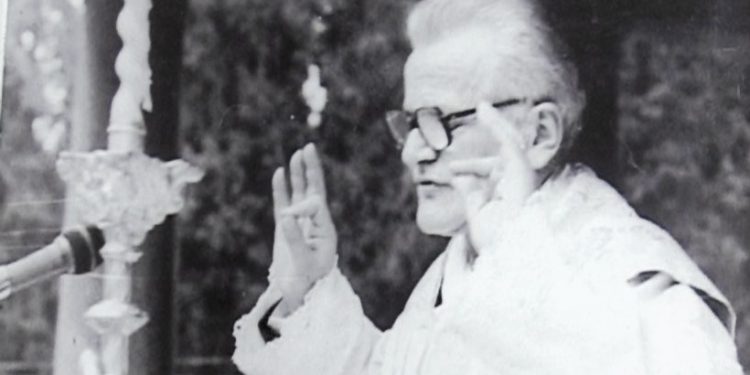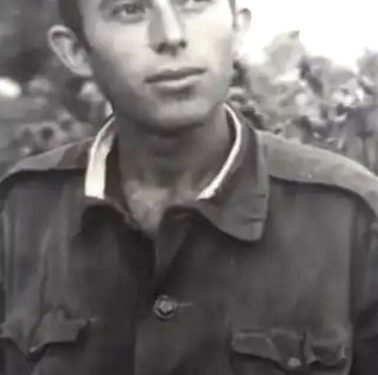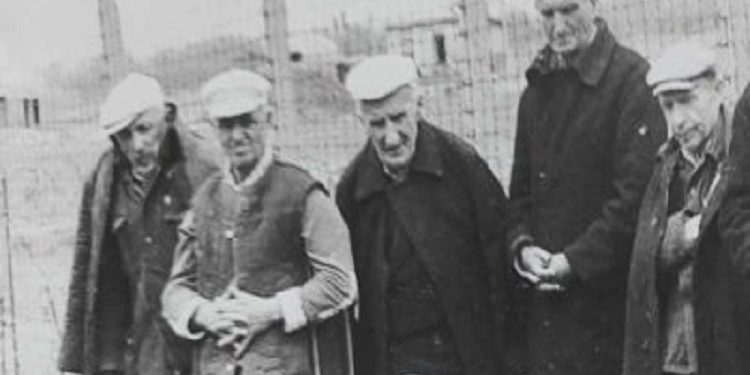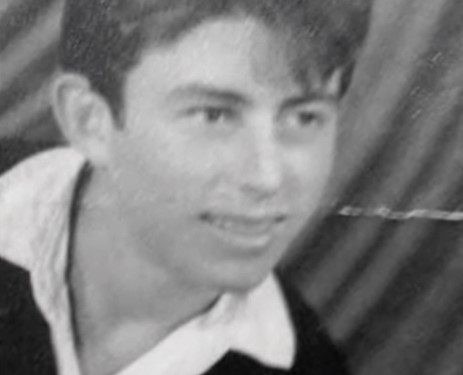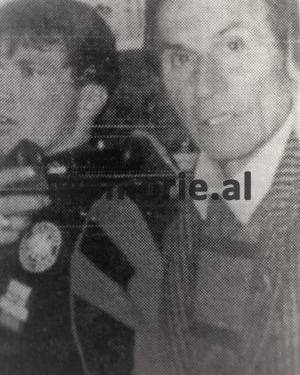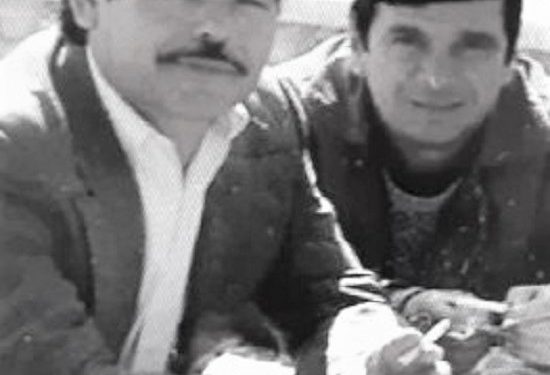By Shkëlqim Abazi
Part Forty-eight
Memorie.al / I were born on 23.12.1951, in the black month, of the time of mourning, under the blackest communist regime. On September 23, 1968, the sadistic chief investigator, Llambi Gegeni, the ignorant investigator Shyqyri Çoku, and the cruel prosecutor, Thoma Tutulani, mutilated me at the Internal Affairs Branch in Shkodër, split my head, blinded one eye, deafened one ear, after breaking several ribs, half of my molar teeth, and the thumb of my left hand, on October 23, 1968, they took me to court, where the wretch Faik Minarolli gave me a ten-year political prison sentence. After cutting my sentence in half because I was still a minor, sixteen years old, on November 23, 1968, they took me to the Rrëps political camp, and from there, on September 23, 1970, to the Spaç camp, where on May 23, 1973, in the political prisoners’ revolt, four martyrs were sentenced to death and executed by firing squad: Pal Zefi, Skënder Daja, Hajri Pashaj, and Dervish Bejko.
On June 23, 2013, the Democratic Party lost the elections, a process that is perfectly normal in the democracy we claim to have. But on October 23, 2013, the General Director of the “Rilindas” (Renaissance) Government sent Order No. 2203, dated 23.10.2013, for; The dismissal of a police employee. So, Divine Providence was intertwined with the neo-communist “Rilindas” Providence, and precisely on the 23rd, I was replaced, no more and no less, by the former operative of the Burrel Prison Security. What could be more significant than that?! The former political prisoner is replaced by the former persecutor!
The Author
SHKËLQIM ABAZI
RREPSI
(Forced labor camp)
Memoir
The First Meeting
(The boat sunk in the swamp)
Perhaps sports seem a somewhat unacceptable profession for a priest, but since I had known religious figures who were masters in several professions, I was not at all surprised that a priest could have also been a football player in his youth. “After all, they are people too, they weren’t born old, but have gone through the phases of development in life, like everyone else!” I convinced myself. As for physical appearance, I classified him according to the division applied by Father Mark Hasi, so he fell into the category of “tough guys” and “manly guys.” With that powerful, vital athlete’s physique, he did not show his true age. That’s why, in front of Mondi, I stubbornly insisted; “Father Simoni died young, around seventy,” fortunately, I was wrong by a full fourteen years. But, surely, all of us who lived with him must have made this mistake.
The days that followed, I got to know him better. I found the humble martyr and the fierce hero embodied in him! Father Simoni was the bravest priest, of all the Catholic priests I happened to know. He openly affirmed his service to the faith. I myself heard him debating with representatives of the prison command and with every official who came for inspection: – “I am a priest; I am a convinced soldier of Christ! I feel very good right where I am! I have my cell, to fulfill my duties before God and Jesus! I am ready to endure even worse!” – He affirmed, proudly. He was a man with a very strong, intransigent, unbreakable character. For these qualities, everyone respected him, even the simple police officers.
He was not distinguished for any deep theoretical preparation, like other priests, because the religious schools were closed before he completed the full cycle, but this deficiency he compensated for and surpassed with personal studies and with the unwavering determination he demonstrated in defense of principles. He was the most intolerant priest when someone tried to offend the sanctity of the doctrine and the Christian dignity that he blindly believed in; he reacted harshly, sometimes even violently. To illustrate this fact, I told Mondi about a painful event, as unique as it was banal, where I accidentally ended up being a witness to an unpleasant fight.
As I mentioned above, Father Simoni enjoyed the respect of everyone without exception, even the police. An individual with such a strong and manly character, furthermore a devout priest who proudly proclaimed this on every occasion, could not escape the vigilant eye of the intriguing communists. The operative and the high leaders of the prison and the Internal Affairs Branch knew these qualities of the individual Simon perfectly. Therefore, they sought by all means to humiliate him, to “break the nose” of the warlike and proud priest. For this purpose, they incited the prison scoundrels, whom they fed and kept around, to use them as battering rams against dignified individuals when the work required it. They staged ordinary provocations, which, if possible, would end in violent fights.
These wretches, blind tools in the hands of the operative, had occasionally incited Father Simoni, but he had avoided them with composure. One day during the recreation hour, together with some of my age-mates, we were pacing back and forth in the narrow prison yard. The group of “scouts” a little further away was gargling loudly like geese; it was clear, they had targeted someone to attack. Although supported by the operative, the troublemakers and riff-raff had never dared to mess with our group, because they were afraid of our reaction, young and strong as we were at that time, we could have done them serious harm. When they had happened to provoke, even one of us, all of us, as a single body, would come to his defense; thus, since they were afraid of confronting all of us at once, they were intimidated and skillfully avoided a fight.
We continued pacing without paying attention to their nonsense. Before we had finished two laps, we heard a loud scream followed by swearing, with very vulgar language, the jargon of street gypsies. We stopped. A few meters further, Father Simoni, red as a hot pepper, was facing three louts who were inciting him with low insults and ordinary swearing. Even though he was extremely angry, with surprising calmness, this brave man tried to avoid them. By chance, the police whistles blew at the most decisive moment; in the last seconds of the recreation hour. The troublemakers left. We all headed for the cells. We went inside. Father Simoni sat down near the attack position. I saw that he was fuming, but I did not speak to him, I let him calm down. After a few minutes, the three villains appeared at the door. It seems their masters had tasked them with taking the provocation to the extreme. The fact itself denounced them: they had been allowed to wander around the corridor, while the rest of us were only opened the door twice a day.
The most shameless among them came forward, but with that vulgar vocabulary that my ears were hearing for the first time in political prisons, he continued the custom of swearing, right where he had stopped in the yard. He poured out his entire linguistic sewer in this river of insults. He swore at his mother, whom he adored with special veneration: – “I’ll fuck your mother!” – the scoundrel swore. – “Thank you, now I’ll call you father!” – The reddened priest restrained himself. He swore at his sister, who followed him to prison with a basket on her arm with sisterly love: “- I’ll fuck your sister!” – “Thank you, now I’ll call you brother-in-law!” Perhaps the second answer incited the provocateur further. Unprepared for this gentle reaction, the scoundrels thought they had intimidated the priest, and thus the task they had been assigned seemed to them easier to fulfill if they increased the dose of insults even more.
Father Simoni was at a crossroads, purple to the root of his hair, he was barely restraining himself. Even though he understood that the operative had pushed them, with maximum composure, he tried to avoid the fight, but it was not possible. The climax would arrive a few moments later, when again the bravest or the most idiotic among them, approached him and spewed in his face: – “I’ll fuck Christ!” This swears word was the last straw! That brave man, who until that moment had swallowed every insult, could not anymore! He bent down abruptly, grabbed the thick wooden slipper from under the bed, and launched it onto the provocateur’s snout, with all the strength of his arm. Now anger had seized him, under the influence of resentment for the unimaginable insult, he had lost his logic; he had taken on the features of a rabid beast.
After two gentle replies, reason darkened for him, the third reply was the slipper. A bloody, murderous reply! Outside the preaching ethics he applied daily with others. Splatters of blood burst onto our bedding, staining the dirty floor and walls, while the giant scoundrel lay down spread-eagled on the cement and the enraged priest pounced on him, like a hawk on its prey. He punched and screamed, with everything he had in his head: – “No, man, not up to Christ! You swore at my mother, I called you father! You swore at my sister, I called you brother-in-law! But now? What am I going to do to you?!” – And he kept hitting and hitting the sprawling body and the bloody face. We who were near did not intervene initially, with the thought that God knows what he is doing! This scoundrel and others like him deserved such a lesson! But when the priest, blinded by rage, did not stop, we intervened and blocked him.
Trembling with anger, yellow as saffron, he turned to us and said: – “Let me beat this filth! He is rude and faithless, he is useless to anyone!” Naturally, we could not let him continue further in his rightful punitive initiative. Not because we felt sorry for the faithless one, he reaped what he sowed, but we thought about the consequences that would fall on our friend. Surely after this, Father Simoni spent a month in solitary confinement, which was not his first time, but this time fully deserved. The pimp received a lesson of unique value, for himself and his like!
He also got a perpetual mark, which is clearly visible, as a souvenir from Father Simoni, in defense of Christian dignity. This clown, who all political prisoners of those years and later ones know who he is, has now self-assumed the position of a leader; supposedly in defense of the layers of the formerly persecuted (I hope this is a form of apology to the Father and the other priests for the troubles he caused them those years). He was one of those whom Father Simoni called; “stinking spies.”
After a few months, I was returned to Rrëps, the priest remained in Burrel, but nevertheless, Father Simoni and I would remain good friends. For twenty years, we could not meet. In the nineties, he was the initiator who organized the first mass, in the Rrëmaj cemetery. Consequently, the first Albanian religious figure to shatter the barriers of communism! After a year, I met Father Simoni. After embracing each other with longing, we asked each other about our health and families, but also about mutual friends, those who were alive and those who were not.
Father Simoni told me: – “We hoped for a long time to reach this day! The dream of freedom of belief and of the missing democracy gave us the strength to resist evil and stay alive! But, by God’s faith, we did not think so! Look, man, how Albania has ended up! With boys and girls who just want to leave; with villains and whores, with spies and Philistines who have taken the head of the country!” I tried to give courage to this brave man with a lion’s heart, now weakened. I preached more or less:
“The future will be different, everyone will find themselves, and that we, the unjustly punished by the communist dictatorship, will get our due!” Naturally, I did not even believe what I expressed, but I did not want to hurt the heroic priest. I wanted to ease his despair and eliminate his disappointment in the dreams of freedom. A few years passed, and I met him again at the Milot Bridge. This time he was smiling, his cheeks were red, a youthful aura had fallen upon him; he seemed completely renewed. I was happy when I saw him healthy. We greeted each other, sat down in a roadside cafe, and started talking.
-“Father Simon, I am happy to see you rejuvenating every day! It seems you have found yourself?” – “By God’s faith, I have found myself well enough! I have been back in Mirdita for some time now, where I was before they put me inside. I am in good health and I feel as God wants! I have love with all my neighbors, they love me, and I love them! We have done some work on new churches and the reconstruction of the old ones.” – “And Shkodra, how are things there?” – I asked jokingly. “Shkodra? Well, like Shkodra, my dear boy! The Philistines have increased. Those who destroyed churches and mosques, and who used to spy on us, are now big shots! But, because some priests have also come from abroad, who did not spend a single day in prison, and now they want to question us, supposedly we could not resist communism to protect the church!”
I understood, he had remained the same! The Simon of the early years! Honest to the point of delirium, just to the razor’s edge, stubborn to the point of madness! He could not feel well when confronted with those he considered servile and hypocritical Philistines! Neither the long sufferings and torments nor even age had managed to flatten the lava of that fiery crater! Even when I met him later, I always found the same person; the just and proud Father Simon; the man of his word, irreconcilable with evil! In fact, I would add: the same early athlete, who, for the defense of the dogma, as he understood it, was ready to fight again with fists and kicks, as he did then in prison…
-“This was my Simon, dear Mondi! At least, this is the knowledge I have!” He was a fiery heart, in a troubled soul! Who was never appreciated as he deserved! I hope this “tough guy” finds the missing peace near “Saint Mary,” as he often mentioned to me. May he rest in eternal peace! Amen!
Continuation of the interrupted part, for the homage
Naturally, the concentration in prisons was not secure. For reasons without reason, the demography could crumble and change from day to day; the composition could dissolve from week to week. In a labor camp with a housing capacity, let’s suppose for two hundred people, within a week it could double to four hundred and in two months, reduce to one hundred. So, the dune phenomenon occurred more or less. The stationing of the desert sand, which at the mercy of the winds crashes here today, a thousand kilometers further tomorrow, was repeated in the prison camp, one never knew where the morning would leave you and where the evening would find you.
If the nominative staff changed constantly, the organizational-grama was planned with static directives. Movements were conditioned, based on priorities and megalomaniacal five-year plans, as well as depending on the needs for labor force, which an X or Y construction site had. Every event, no matter how tiny it seemed, suddenly changed the number of convicts. The communist regime had based its existence on orders and directives, unsupported by objective realities. When the Great One saw a dream, he presented it to the Party plenums, and all the others rushed to implement it. He fancied, for example, that he had dried the sea, that he had opened terraces on rocky mountains, that he had built irrigation systems for agricultural crops in the sky, that he had endlessly increased the number of residential buildings, that he had installed industrial giants, that… he had challenged God, etc., etc.,..!
This paranoia, like a plague epidemic, gradually seized the statesmen, even the most obscure clerk of the “Red Empire.” Then the imaginary-fantastic action began on a large scale, for the realization of the nocturnal dreams on the ground. They set up teams of genuine specialists from all fields, under the direction of members of the Political Bureau of the Central Committee of the PPSh (Party of Labor of Albania), and provided non-stop directives to all institutions in the country, especially the Party Committees in the districts and the Internal Affairs Branches.
In the instructions they sent to the implementing bodies, they detailed the needs for labor force, more or less determined the preferred professions, but especially specified the age groups and class affiliation of the persons to be arrested. The increase or decrease of the number in prisons was influenced by some factors which, despite the great desire to maintain a somewhat constant figure, did not depend only on the will of the designers; because a series of major agents were at work, such as: incurable diseases, which were an inseparable plague of prisons, a consequence of permanent mistreatment and violence, of poor clothing, of long-term malnutrition; add to these accidental deaths at work, unintentional self-inflicted injuries, intentional self-inflicted injuries, voluntary losses over the barbed wire or by other means; deaths due to age, as well as rare releases when someone completed their sentence terms; they created the gaps we are talking about.
Consequently, there were vacancies, which forced the Ministry of Internal Affairs and the Prosecutors’ Offices in the districts to issue circulars and arrest warrants in bulk, while the General Directorate of Prisons planned occasional displacements from one camp to another, according to the needs for labor. Of course, these were some of the reasons why my professors changed often. During the years of “university,” I had the chance to change several “seasonal professors,” if I can call them that.
During the summer “vacations,” in order not to become sluggish, they planned a light, almost entertaining program for me. The hours were filled with some physical activity, or music, painting, and even singing lessons, although in the latter, I turned out to be a complete fiasco, right from the first rehearsals. Despite the fact that the elective subjects did not constitute the essence of the academic program, there were plenty of professors for these specialties, even among the most qualified ones.
Great coaches, absolute champions, elite athletes had ended up in prisons. I will mention a few: for physical culture, there were several vanguard athletes, such as track and field athletes, wrestlers, boxers, football players, etc., of the highest representative levels, even members of Albanian national teams, known in the international arena, such as: in football, Shyquri Gruda, former football player of “Vllaznia” and the national team, Zihni Dervishi from Durrës, also of this caliber, the former second goalkeeper of the national team, Sefedin Juniku, whom I would also have as a math professor for some time, the former first goalkeeper, Qemal Vogli, had been released shortly before my arrival. Quality athletes such as: Guri Panariti from Korça, former national champion in several track and field disciplines, Pavllo Popa, former athlete of the same levels, with “Vllaznia,” Franko Cara, etc. Record-holding wrestlers and weightlifters, such as: Sakip Kaloshi, Vladimir Kosturi, and Bebi Shameti. Brilliant boxers, who, if this sport had not been persecuted, would certainly have become great champions, such as: Dhori Gërnjoti, Andon Vanko, Stavri Qirko, all three from Korça, Ndoc Gjoni from Shkodra, Petrit Nallbani, from Berati, etc.
So, in this entire army of quality athletes, dozens were professors, but I was attached to Shyq Gruda, as the most theoretically capable. In the field of music, you would find specialists who graduated from the most prestigious schools, from the Prague Conservatory, Ali Hoxha, who was simultaneously a composer and instrumentalist for many wind instruments, but also for guitar and double bass, Fiqiri Muho from Gjirokastra, who, when I arrived, mastered Vaçe Zela’s guitar. The famous Starova brothers, from Pogradec, with Italian musical culture, etc. The most prepared one was engaged with me, the composer Ali Hoxha, even though I did not promise any special talent.
In painting, several dozen distinguished painters showed their readiness to work with me, led by Sadri Ahmeti, Robert Morava, Myslim Fuatllari, etc. But the painter of magical landscapes, Myslim Fuatllari from Pogradec, was more engaged. In addition to these, I also had theologians from all four faiths, such as from the Catholics; Father Zef Pllumi, Father Ernest Trashani, Father Mark Hasi, Father Pjetër Meshkalla, Father Nikollë Mazreku; from the Muslims, Hafëz Sabri Koçi, Mufti Faik Hoxha; from the Bektashis, Baba Bajram Mahmutaj, Dervish Meleq Hasa; from the Orthodox, Father Vasillaq Vangjeli, Father Stavri Pilafi.
Since these were elective subjects, who were generally held during the summer vacations, they did not take up much of my time and did not cause me much trouble, but I also did not try too hard, I practiced what I liked, and what I was not good at, I left. Thus, in music, I liked the guitar, but since I was completely tone-deaf to solfeggio, I did not have a chance to progress, and in the end, I withdrew. In boxing, I turned out to be a real failure; after having my face repeatedly smashed by real boxers, such as Andon Vanko, who was roughly my weight, I also quit this; I did not even attempt to fight with Gërnjoti or Stavri. Only painting attracted me, so thanks to Professor Myslim’s passion, I managed to enter the world of colors, I made good progress; then with the arrival of Sadri Ahmeti, I started working with pencil and ink, where he felt like a true master.
Thus, studies proceeded somewhat. The results satisfied me and increased my optimism for the future. But the happiest were my teachers, who, through my progress, valued their didactic abilities. Despite the lack of teaching materials, they spent excessive energy to make the lesson as practical and attractive as possible. But the ones who wandered in dreams and flew above the clouds, who did everything they could to lighten my load and create conditions for me to have as much time as possible for studies, were the tutors, my dear elders. Among themselves, they had made a pact without a protocol; they voluntarily divided my personal duties, in such a way that I had no choice but to accept this agreement.
Bajram Hoxha cooked the little food that my family brought me, at the same time he had also taken upon himself the boiler for hot water for the shower, Xhelal Bey washed the clothes and mended them when they were torn; I would always find washed clothes at the head of the bed. Uncle Esheref took my food from the cauldron in the kitchen and brought it to my bedding, but at the same time he also followed the study regimen and tried to maintain order and silence; Uncle Dauti, Sulo, Rizai, Father Vaska, and the others, as the older ones, had taken on some lighter duty, especially to entertain me with stories and past events, when I had a free moment; Muharremi continued his duty as a guardian angel, vigilant with clenched fists, and woe to whoever crossed the line. With Refat Arixhiu, Et’hem Hito, and some others, I would play a hand of dominoes even though I was not skilled at it. But all of these were in my free time, which was becoming increasingly limited. Memorie.al




